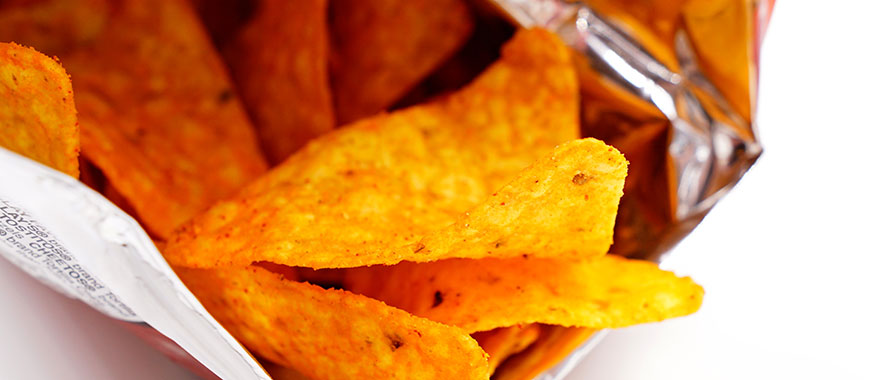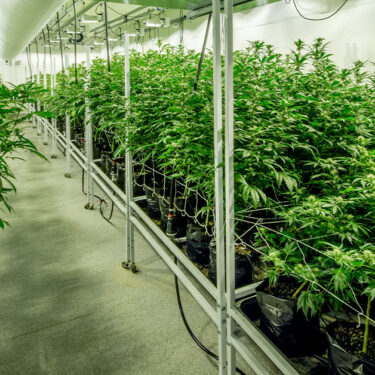Federal regulators in the U.S. are demanding that several cannabis companies stop making THC-containing products that mimic common children’s snacks like Doritos, Nerds candy, and Oreos. Making cannabis edibles that kids could mistake for normal food items is “reckless and illegal,” Samuel Levine, a Federal Trade Commission director, said in a July 5 statement announcing the cease-and-desist letters that were sent to six companies, in conjunction with the U.S. Food and Drug Administration.
Images show that these products have packaging that looks strikingly similar to the mainstream snacks that inspired them; for example, a package of “Doritos” nacho cheese chips uses the brand’s familiar colors and logo, with the addition of THC warnings at the bottom of the packaging.
Featured Solutions
The cease-and-desist letters order the companies — located in California, Virginia, North Carolina, Missouri, New Mexico, and New Jersey — to stop marketing their THC products in ways that could appeal to children and ask that they inform the federal agencies within 15 days about the steps they have taken to resolve the concerns.
Although these items could be sold legally in some states, recalls are still possible and the companies producing them could be sued for trademark infringements or accidental ingestion, said Emily McDaniel, Broker, Commercial Insurance, Burns & Wilcox, Denver, Colorado. These risks could make it harder for them to purchase Cannabis Insurance policies such as Products Liability Insurance and Product Recall Insurance.
“When extending coverage for product liability, our carriers want to review a list of products and labels,” McDaniel said. “Carriers use caution because the risk of getting pulled into a claim for trademark infringement when there is a lookalike product, or accidental consumption is higher. Reviewing product labels and packaging can be our first lines of risk mitigation when it comes to avoiding a claim.”
Cannabis packaging requirements vary in U.S.
In the U.S., where 23 states have legalized cannabis for recreational use and 40 allow medical use, each state has its own packaging regulations for cannabis companies. According to The Consumer, all states require child-resistant packaging and most require packaging to be resealable, while some states require opaque packaging and prohibit imagery such as cartoons that could appeal to children.
Reports of lookalike cannabis products, from the Doritos to other items like Oreo-esque “Stoneos” and colorful sour gummies mimicking mainstream brands, have led to calls for tighter packaging regulations on the state and national levels, STAT reported in July 2022. Research points to many of these products containing high THC doses and some have been linked to child hospitalizations after accidental ingestions, the publication reported.
While McDaniel said a cannabis-infused “nacho-cheese tortilla chip” may not technically be illegal to sell with the type of packaging seen in the news reports, companies engaging in such marketing would want to exercise additional caution.

In order for companies to protect themselves from a lawsuit, they would want to make sure that if they are going to tread the line of marketing products that are similar to what kids might consume, they need to put extra-protective safeguards in place so that kids cannot easily access that marijuana product.
“It does put the company at a higher risk,” McDaniel said. “In order for companies to protect themselves from a lawsuit, they would want to make sure that if they are going to tread the line of marketing products that are similar to what kids might consume, they need to put extra-protective safeguards in place so that kids cannot easily access that marijuana product.”
In Canada, where the Cannabis Act was approved in 2018 to legalize and regulate the production and distribution of cannabis products in the country, federal guidelines would not allow lookalike products whatsoever, Malik explained. “It is pretty strict,” she said, noting that anything resembling the Doritos-type packaging would be prohibited. “It is typically a black package with specific wording, and there is no color or anything that would attract children or even an adult. It is very plain and informational only.”
If the copycat products prompted lawsuits alleging injuries due to accidental ingestion because a child or adult did not realize it was a cannabis product, a cannabis company’s Products Liability Insurance could cover legal defense, medical costs, settlements and other expenses. Costs related to trademark infringement allegations may not be covered, however. “Trademark infringement is typically excluded on a policy,” McDaniel said.
Concerns over accidental ingestions
Accidental ingestion of cannabis products by children is a growing concern in the U.S. and Canada. One study showed that in 2021, more than 3,000 children under 6 years old accidentally ate cannabis edibles compared with more than 200 children in 2017, marking an increase of more than 1,375%, NPR reported in January. Also, earlier this year, officials in Arizona announced plans to address an alarming rise in the number of children accidentally ingesting marijuana products. Some provinces in Canada were also seeing an increase in accidental cannabis poisoning among kids as of September of 2022, Global News reported at the time.
Although there is “some responsibility from the consumer to prevent underage consumption,” insurance carriers may be hesitant to work with companies that do not have adequate packaging safeguards, McDaniel said. This can make it more difficult for them to obtain Products Liability Insurance. “The carriers will usually review the labels and say whether or not they want to be extending product liability coverage to that type of a company,” she said.

It is important to protect your assets and be able to continue operating in the event of a claim. If there is a loss, companies can find themselves reallocating resources and capital into defending their business and products in a lawsuit, which can be costly.
Even given rising reports of accidental ingestions, cannabis companies do not seem to be seeing a large number of liability claims, according to McDaniel. This is the case for everything from trademark infringements to accidental ingestions and other product issues.
“We have been insuring marijuana for 12 years and we are not seeing significant product liability losses or claim history,” she said, adding that this does not discount the importance of carrying insurance. “It is important to protect your assets and be able to continue operating in the event of a claim. If there is a loss, companies can find themselves reallocating resources and capital into defending their business and products in a lawsuit, which can be costly.”
Preparing for the risk of recalls
Despite cannabis being illegal in the U.S. on a federal level, regulators are still able to recall cannabis products as needed, McDaniel pointed out. Just as they took action with the cease-and-desist letters, federal agencies can also issue recalls for these products “even though they are not federally recognized” as legal, she said.
“If the government does mandate one of these products to be recalled from the shelves, their Product Recall Insurance could respond,” she said. “That can also be an enhancement on a policy but not every carrier offers it.”
When a cannabis company faces a recall for one of its products, Product Recall Insurance could help pay for expenses associated with physically recalling and disposing of products, customer notification, product replacement, and public relations support for brand rehabilitation.
On June 7, officials in Michigan announced a recall of marijuana-infused edibles over excessive THC levels and non-compliant packaging, including packaging that is not child-resistant, WXYZ Detroit recently reported. Mold has also been known to cause cannabis recalls, McDaniel said, pointing to a November 2022 recall in Colorado of almost 200 batches of cannabis flower due to potentially unsafe levels of yeast and mold.
Issues such as mold and mislabeling have also led to cannabis product recalls in Canada, Malik said. “Mislabeling is definitely an exposure that these producers have,” she said. “If the level of THC is off even slightly, it could be something that is subject to a recall.”
As cannabis companies operate amid frequently changing rules and regulations, it is important for them to prioritize risk management and work with specialized insurance brokers and attorneys. “Cannabis companies can help protect themselves from a potential loss by investing in the right packaging, working with an attorney to review their packaging, and carefully reviewing their Products Liability Insurance and Commercial General Liability (CGL) Insurance with Cannabis specialists in this space,” McDaniel said. “Those are the best things a company can do to mitigate risk.”
Even in Canada, where regulatory changes are less frequent due to federal legalization, cannabis companies continue to face the risk of recalls and lawsuits. “Each province also has their own set of rules to abide by,” Malik explained. “Having a quality assurance team is always important. Most companies do have that in place, and it helps mitigate their risk of a recall.”






